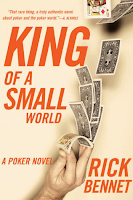You Have to Play Good to Run Bad and You Have to Run Bad to Get Good
I picked the book back up again recently while thinking about perhaps adding it to my “Poker in American Film and Culture” syllabus. I continue to teach the course each semester and every time I do I tend to swap various readings in and out of the list of assignments.
I’ve never included Bennet’s novel, in part because it was out of print back when I started teaching the class. But it’s available on Kindle now and used copies are easy enough to track down, so I am considering assigning it, perhaps in the spring.
You can read that earlier post for a brief overview of the book and a full review. However, I did want to share one passage from it that struck me during this revisiting of the book, one that I didn’t discuss in the earlier post. (Indeed, I’m discovering there are a number of thought-provoking passages that I didn’t talk about in that post from three years ago.)
The main character and narrator, Joey Moore, is a poker player and frequently draws analogies between the game and various conflicts and other events in his life, using lessons he's learned at the table to help him understand and explain the world he inhabits. These comparisons are deftly drawn by Bennet, not overwhelming the story at all and like I say giving the reader much food for thought both about poker and other matters of importance.
During the first third of the novel Joey is involved in a cash game and interweaves a digression covering a few different ideas, including one exploring how “poker’s an emotional challenge” thanks in large part to the fact that all are susceptible to runs of bad luck.
Joey has a distinction to draw, though, regarding how bad luck differently signifies for good and bad players.
“Here’s a truth,” he explains. “You have to play good to run bad (because a bad player will lose his money eventually anyway, so bad luck just costs him time at the table, not actual money in his pocket) and you have to run bad to get good (because as long as you’re having good luck, you won’t bother developing the skill to win with average luck).”
From there he explains how his poker education has primarily come “during extended bad runs.” He also points out that “I never had really good luck when I was learning, so I didn’t get seduced into bad habits.”
I think most of us who’ve played poker for even a little while have come to understand the first part of Joey’s truth, that in order to “run bad” one has to be a good player, as it requires a certain measure of skill to put oneself in a position to suffer the misfortune of not earning one’s supposedly deserved rewards at the table. For example, it’s an oft-repeated maxim that you can only suffer a “bad beat” (really) after having played a hand well.
Less obvious (I think) is the second part of Joey’s truth that says “you have to run bad to get good.” Most of us understand that we probably learn more when we lose, especially when those losses come as a result of our mistakes and we’ve found a way to identify those mistakes and thus take a first step toward avoiding them in the future. But that’s not really what Joey’s saying -- he’s pointing out we have to “run bad” (be unlucky) in order to “get good” (or be inspired to work on our games).
I’m probably oversimplifying the idea, and in fact the more I think about it, the more I believe there’s something more to learn from it. In any event, it sure makes for a nifty, paradoxical-sounding poker proverb.
Like I say, King of a Small World is full of such moments, and I’m enjoying rereading them and thinking about perhaps sharing them with a group of students to discover their thoughts about Joey’s various “truths.”
Labels: *by the book, King of a Small World, Poker in American Film and Culture, Rick Bennet
















